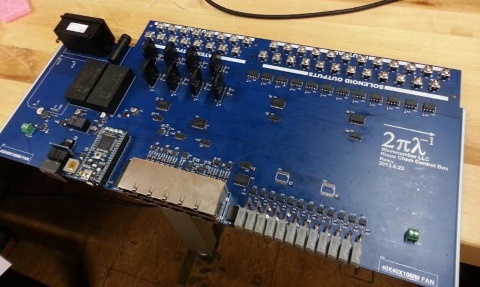Example project for the Rioux Chem control box
Rioux Chem Control Box

This is the example project for the Rioux Chem Control Box. I have posted some youtube videos to guide you through the hardware and software:
Rioux Chem Control Box - Hardware
http://www.youtube.com/watch?v=MoZ92GRYa4s
Rioux Chem Control Box - Software - Part I
http://www.youtube.com/watch?v=_MwaTLL4dyA==
Rioux Chem Control Box - Software - Part II
http://www.youtube.com/watch?v=j_P89izfgoQ
DRIVERS/CHEM_BOX_INTERFACE.h
- Committer:
- wavenumber
- Date:
- 2021-11-01
- Revision:
- 9:c830667212f4
- Parent:
- 7:de452fceafc1
File content as of revision 9:c830667212f4:
#include "MODSERIAL.h"
#ifndef CHEM_BOX_INTERFACE
#define CHEM_BOX_INTERFACE
#define API_VERSION "1.1"
// _____ _ _ ______ __ __ ____ ______ __ _____ _____
// / ____| | | | ____| \/ | | _ \ / __ \ \ / / /\ | __ \_ _|
// | | | |__| | |__ | \ / | | |_) | | | \ V / / \ | |__) || |
// | | | __ | __| | |\/| | | _ <| | | |> < / /\ \ | ___/ | |
// | |____| | | | |____| | | | | |_) | |__| / . \ / ____ \| | _| |_
// \_____|_| |_|______|_| |_| |____/ \____/_/ \_\ /_/ \_\_| |_____|
//
//
//Initializes the hardware for the Chem box. Must be called before any other CHEM box functions are called.
void InitChemBox();
extern DigitalOut RED_LED;
extern DigitalOut GREEN_LED;
//Special Note.... All of the Digital IO functions are queued. This means that they do not take effect
//until the function FlushDigitalIO() is called.
//Enables one of the 8 heater channels. Just pass a number between 0 and 7
void EnableHeater(uint8_t RelayIndex);
//Disables one of the 8 heater channels. Just pass a number between 0 and 7
void DisableHeater(uint8_t RelayIndex);
//Enables one of the 12 Solenoid valve channels. Just pass a number between 0 and 12
void EnableSolenoidValve(uint8_t SolenoidIndex);
//Disables one of the 12 Solenoid valve channels. Just pass a number between 0 and 12
void DisableSolenoidValue(uint8_t SolenoidIndex);
//Enables one of the 4 digital I/O channels. Just pass a number between 0 and 3
void EnableMiscDigitalOutput(uint8_t DigitalOutIndex);
//Disables one of the 4 digital I/O channels. Just pass a number between 0 and 3
void DisableMiscDigitalOutput(uint8_t DigitalOutIndex);
//Updates all of the Digital I/O, heater and solenoid channels. Call this function to enable all the queued up I/O commands
void FlushDigitalIO();
//Immediatelly disables all heaters and Solenoids. FlushDigitalIO() does not need to be called for this to have an effect
void DisableAllHeatersAndSolenoids();
//Enables the +/-15v power to the MFC Channels
void EnableMFC_Power();
//Disbales the +/-15v power to the MFC Channels
void DisableMFC_Power();
//Writes to one of the MFC Analog output channels. The Value given to the function is in volts
void WriteMFC_AnalogOut(uint8_t Channel,float Value);
//Reads on the MFC Analog input channels. The value returned is in volts
float ReadMFC_AnalogInput(uint8_t Channel);
//Reads a 4 to 20mA channel. value returned is in amps (.004 to .020)
float Read4to20(uint8_t Channel);
//Turns the Fan on
void EnableFan();
//Turns the Fan off();
void DisableFan();
// Makes the buzzer ring for a time period (in seconds)
//Note that this function immediately exits and the beeping is done in the background
//If you want to beep a couple times, you will need to delay for a certain time period after you call this function
//before you can call it again
void Buzz(float Time);
//reads a thermocouple. Returns temperature in degrees C
float ReadThermocouple(uint8_t ThermocoupleIndex);
//Determines if a thermocouple is disconnected. Each BIT in the return will be set if the Thermocouple is open.
//so, to see if a particular thermocouple is no connected, you need to bitmask the result.
/*
OC_State = ReadThermocouple_OC();
if(OC_State & (1<<5))
{
//we are here if thermocouple 5 is not connected. The if statement does a bitwise AND to check the bit
}
*/
uint16_t ReadThermocouple_OC();
//Determines if a thermocouple is shorted to ground. Each BIT in the return will be set if the Thermocouple is sorted to ground.
//so, to see if a particular thermocouple is shorted to ground, you need to bitmask the result.
/*
SCG_State = ReadThermocouple_SCG();
if(SCG_State & (1<<7))
{
//we are here if thermocouple 7 is shorted to ground. The if statement does a bitwise AND to check the bit
}
*/
uint16_t ReadThermocouple_SCG();
//Determines if a thermocouple is shorted to VCC. Each BIT in the return will be set if the Thermocouple is shorted to VCC.
//so, to see if a particular thermocouple is shorted to VCC, you need to bitmask the result.
/*
SCV_State = ReadThermocouple_SCG();
if(SCv_State & (1<<4))
{
//we are here if thermocouple 5 is shorted to VCC. The if statement does a bitwise AND to check the bit
}
*/
uint16_t ReadThermocouple_SCV();
//Determines if a thermocouple is faulted (see MAX31855 Datasheet). Each BIT in the return will be set if the Thermocouple is faulted
//so, to see if a particular thermocouple is faulted, you need to bitmask the result.
/*
Faulted_State = ReadThermocouple_FAULT();
if(Faulted_State & (1<<10))
{
//we are here if thermocouple 10 is faulted The if statement does a bitwise AND to check the bit
}
*/
uint16_t ReadThermocouple_FAULT();
/*
Read the internal reference temperature
*/
float ReadInternalTemperature(uint8_t ThermocoupleIndex);
//Writes to one of the Misc Analog Output channels. The Value shoul dbe in Volts (from 0 to 5v)
void WriteMISC_AnalogOut(uint8_t Channel,float Value);
//Reads one of the MISC Analog Input channels. The value returned will be in volts (from 0 to 5v)
float ReadMISC_AnalogInput(uint8_t Channel);
//This function must be called in your main loop if you want the USB terminal interface to work!
void ProcessTerminal();
//This is the Serial object (see MODSERIAL Documentation on the MBED site for details) for RS-232 channel 0
extern MODSERIAL RS232_0;
//This is the Serial object (see MODSERIAL Documentation on the MBED site for details) for RS-232 channel 0
extern MODSERIAL RS232_1;
//This is the serial object for the USB connection. Used by the Serial terminal
extern MODSERIAL PC;
//Process incomings lines from the PUmp
void ProcessRS232();
#endif
 Eli Hughes
Eli Hughes

